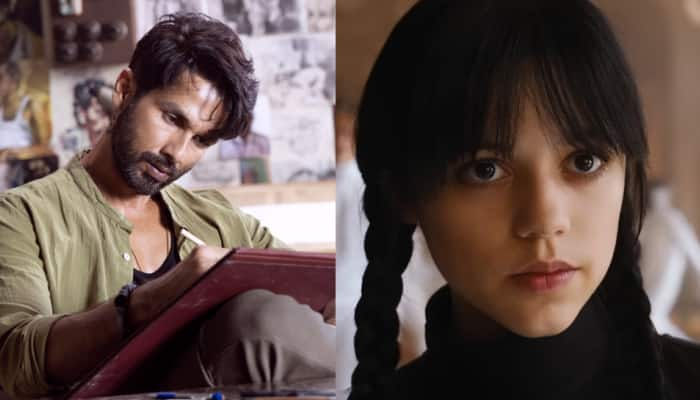'Historic Day': Nitin Gadkari Launches Bharat NCAP Safety Ratings - All You Need To Know
Union Minister Nitin Gadkari has launched India's first and only crash test programme named Bharat New Car Assessment Programme (Bharat NCAP) to test the road safety worthiness of cars.
Trending Photos
Union Minister of Road Transport and Highways, Nitin Gadkari has launched the much-awaited Bharat New Car Assessment Programme (Bharat NCAP) giving a significant boost to road safety campaign in India. This programme is a significant step forward to improve road safety through raising the safety standards of motor vehicles falling in the M1 category. Based on the performance of the car in the tests, the vehicle will be awarded star ratings on a scale of 0-5, for adult occupants (AOP) and child occupants (COP).
Potential car customers can refer to these star ratings to compare the safety standards of different vehicles and accordingly make their purchase decision. Also, this is for the first time India will get its own independent crash test programme, where the government will test newly launched cars on various parameters to assess their road worthiness. It is expected that the demand for safer cars will increase, and with high safety standards, Indian cars will be able to compete better in the global market, increasing the export potential of the car manufacturers in India.
Nitin Gadkari, Union Minister, while launching the Bharat NCAP, said "Today is a very important day in the history of Indian automobile industry but even also it is important for the society. I really appreciate the way in which the Indian automobile industry cooperates and because of their cooperation today it is a time for all of us that we are launching the Bharat NCAP programme."
"It was a mission of the government. Cost of testing from abroad is Rs 2.5 crore and in India under the Bharat NCAP it is Rs 60 lakhs. And with global standards your market is going to increase. I am really happy that it is helpful for the consumers. By the star rating people can understand the quality of the product and now we are going to create awareness in the mind of the people."
What is Bharat NCAP?
The Bharat NCAP programme or Bharat New Car Assessment Programme is India's first crash test programme where car manufacturers can voluntarily offer their cars tested as per Automotive Industry Standard (AIS) 197. The programme is expected to develop a safety sensitive car market in India. The Bharat NCAP will join a family of NCAP across the globe to enhance road safety standards in the country.
Currently, Indian cars are tested by Global NCAP and they have tested more than 50 vehicles from carmakers like Tata Motors, Mahindra, Kia among others. The Bharat NCAP joins the programmes like ASEAN NCAP from Asia, Euro NCAP from Europe, Latin NCAP from South America and NHTSA Test in the United States, apart from Global NCAP, that performs test on cars from countries where NCAP is not launched, including India and Africa.
Driving Towards Safety: BHARAT NCAP Revolutionizes Vehicle Standards in India.#BharatNCAP pic.twitter.com/Y2zA9E3Hni — Nitin Gadkari (@nitin_gadkari) August 22, 2023
Salient Features Of Bharat NCAP
1) The Bharat NCAP will be applicable from October 1, 2023
2) It is a voluntary test and hence not mandatory for any automaker to send their vehicles for testing
3) The cars will be tested as per Automotive Industry Standard (AIS) 197
4) The test is limited to M1 class of vehicles, which means only the cars with 8 passengers + 1 driver and under 3.5 tonne weight category
Bharat NCAP: Ratings Explained
Bharat NCAP is a valuntary crash test programme in which cars are rated basis Adult Occupants (AOP), Child Occupant (COP) and Fitment of Safety Assist Technologies. A safety rating in stars is ascertained, and potential car customers can refer to these star ratings to compare the safety standards of different vehicles and accordingly make their purchase-decision. The Bharat NCAP star rating are assigned through an array of rigorous crash tests, including frontal, side, and pole-side impact assessments.
Case in point, in the frontal crash test, the car is crashed at a velocity of 64 kmph, while the side crash is done at 50 kmph and pole-side tests at 29 kmph. The impact of crash is recorded on sensor-based crash test dummies inside the vehicle and ratings are given on adult safety for front passengers and child safety for rear occupants. A point bsed system is determined which translates to star system, with 5-star rating being the highest safety standard.

Importance of Bharat NCAP
India is one of the worst countries when it comes to road fatalities across the globe. More than 1.3 million lives are lost annually as a result of traffic-related accidents in India. Notably, India’s contribution to these road traffic deaths stands at 11 percent. The Bharat NCAP will serve as an example of consumer empowerment, allowing car buyers in India to make informed decisions based on the star ratings assigned to vehicles.
It is expected that the demand for safer cars will increase, encouraging the car manufacturers to comply with customer needs. With high safety standards, not only will India reduce road fatalities, which impacts the GDP, the Indian cars will be able to compete better in the global market, increasing the export potential of the car manufacturers in India.
Global NCAP vs Bharat NCAP
Till date, the cars sold in India were tested by Global NCAP, a South Africa based non profit body under their SaferCarsForIndia campaign. Launched in 2014, the programme tested more than 50 cars and Indian brands like Tata Motors and Mahindra excelled in the crash test ratings, with lots of their cars receiving 4 and 5-star rating, helping in sales. With Bharat NCAP, road safety standards in India are expected to change and Global NCAP has helped Indian authorities formulate the Bharat NCAP based on their decade old experience of testing Indian vehicles.
Auto Industry Reacts
Venkatram Mamillapalle, Country CEO & Managing Director, Renault India Operations says: "I applaud the Government of India for this visionary and historic initiative; Bharat New Car Assessment Programme (Bharat NCAP) is a truly landmark event in the automotive industry. This significant stride aligns seamlessly with our core mission of the "Human First Program" initiative, propelling us further on our journey to prioritize the safety and well-being of drivers, passengers and pedestrians."
Unsoo Kim, MD & CEO, Hyundai Motor India Limited said, “We welcome the BNCAP safety initiative by Govt. of India and believe this effort will raise safety standards, empower consumers with vital information, and make Indian roads safer for all. At Hyundai Motor India, we remain committed to delivering the highest safety standards across our entire product range”.
Myung-Sik Sohn, Chief Sales and Business Officer, Kia India said "BNCAP is an enhanced road safety movement that extends much beyond just safety ratings for cars. We wholeheartedly commend and will comply with the Government of India for its visionary approach to safety, encompassing both active and passive safety components. Aligned with the Atmanirbhar Vision of the Government of India, this move eliminates the need and associated costs of testing vehicles outside. It will also elevate the global reputation of products from India to the world with good ratings in a big way”.
Vinnie Mehta, Director General, ACMA, who was part of the BNCAP launch event commented, “The launch of BNCAP protocol is indeed historic. It will lead to the integration of advanced safety features in vehicles thus minimising the risk of road accidents and fatalities. This initiative will not only bolster the auto component industry’s value chain but will also stimulate the production of cutting-edge components, encourage innovation, and create global excellence."
Rajeev Singh, Partner & Consumer Industry Leader, Deloitte, Asia Pacific, said “We welcome the announcement of Bharat New Car Assessment Program (Bharat NCAP) today and believe that this is a big step forward in terms empowering our customers to make conscious decision, make it easier for OEM’s to test vehicles faster & at lower cost, help design vehicles which are safer and eventually improve road safety. We are already the third largest PV market going by the trend in first half of this year and hence having our own norms and test facilities for safety of vehicles is very timely and win-win for all.”
Stay informed on all the latest news, real-time breaking news updates, and follow all the important headlines in india news and world News on Zee News.
Live Tv







)
)
)
)
)
)
)
)
)
)

